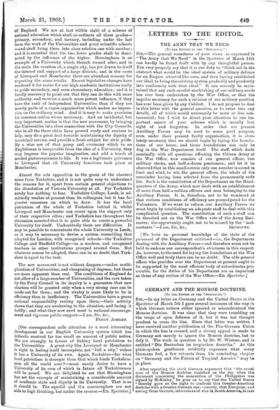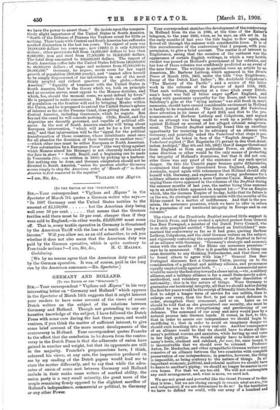GERMANY AND THE MONROE DOCTRINE.
[To THE EDITOR OP THE "SPECTATOR."]
SIR,—In my letter on Germany and the United States in the Spectator of March 7th I gave several instances of the way in which German writers either ignored or misunderstood the Monroe doctrine. It was clear that they were trembling on the verge of open defiance of it, but it was not thought prudent to cross the line. Since that letter was written I have received another publication of the Pan-German Union in which the line is crossed, and a strong appeal is made to Germany not merely to ignore the Monroe doctrine, but to defy it. The work in question is by Dr. W. Wintzer, and is entitled "Die Deutschen im tropischen Amerika." As this plain-spoken gentleman evidently expresses what many Germans feel, a few extracts from his concluding chapter On " Germany and the Future of Tropical America " may be in place.
After repeating the stock German argument that "the moral core of the Monroe doctrine vanished on the day when the document concerning the annexation of the Philippines was signed by McKinley," he goes on to say that the United States "thereby. gave ns the right to confront this Greater-American doctrine with a Greater-German one,—namely, that European, and among them German, interests exist also in South America, in case
we have the power to assert them." He insists upon the compara- tively slight importance of the United States in South America. "South of the Isthmus of Panama the Yankees count for little or nothing. Their trade with Central and South America has suffered a marked diminution in the last ten years. The export of corn was 18,000,000 dollars ten years ago ; now (1900) it is only 8,500,000 dollars ; other provisions fell from 14,000,000 dollars to less than 8,000,000; iron and steel from 17,500,000 to 16,500,000 dollars. The total drop amounted to 100,000,000 dollars. The import of South American coffee into the United States fell from 120,000,000 to 48,000,000 dollars ; of sugar and molasses from 87,000,000 to 38,000,000." Germany, he argues, needs room for her rapid growth of population (800,000 yearly), and " cannot allow herself to be simply dispossessed of her inheritance in one of the most thinly peopled and richest quarters of the globe,—South America." " Equality of treatment with the United States in South America, that is the theory which we, both on principle and as occasion serves, must oppose to the Monroe doctrine, and which, too, should the moment come, we must defend by force." He is prepared to make concessions. He admits that the outflow of population on the frontier will end by bringing Mexico within the Union, and he is prepared to extend the United States's sphere of interest as far as the Panama Canal, thus giving them most of Central America, including Guatemala, which he regrets. But beyond the canal he will concede nothing. Chile, Brazil, and the Argentine are decently governed, and capable of political alli- ances. In the rest of South America anarchy will bring about European intervention, "which will not be for a few months only," and that intervention will be the "signal for the political transformation of those countries, whose inhabitants must once for all abandon the dominion of their territory to another race," —which other race must be either European or North American.
New colonisation by a European Power " (the very thing against which Monroe aimed his Message) is not obscurely indicated as the fate in store f-r South Brazil, and a beginning can be made in Venezuela (this was written in 1900) by picking up a harbour. But nothing can be done, and German emigration should not be directed to South America, "unless the question whether Germany means simply to obey the American order of 'Hands off ! ' in South America is first answered in the negative."











































 Previous page
Previous page